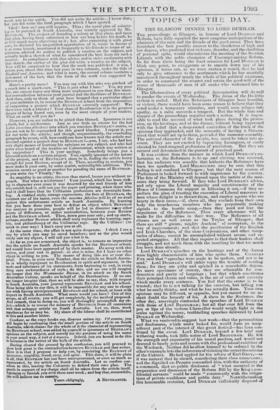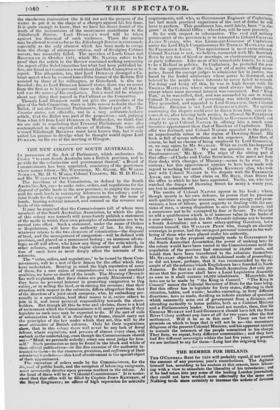that plan having been submitted to him not long before
his death, he THE proceedings at Glasgow, in honour of Lord DURHAM and Reform, have fully equalled the most sanguine anticipations of the
and
s_ only to give utterance to the sentiments which he has manfully statement of the fact, that the form of the work was suggested by maintained throughout nearly the whole of his political existence, BEN'EHAM. in order to command the respect and retain the good-will of the Here's a pretty mess ! You may say with him who was pitched off a coach into a muck-cart, " This is just what I hate." Yes„ my poor scores of thousands of men of all ranks who welcomed him to Sir, one cannot fancy any thing more unpleasant to you than this mani-
Glasgow.
feat contradiction between your journal and the doctrines of BENTHAM'. The Obstructives of every political denomination will do well And then, only to think of your have bragged that a particular object to ponder the events of Wednesday. The doom of the Do-little of your ambition is, to rescue the BENTHAM school from the imputation system is sealed. Had the Reformers of Glasgow been boastful, of supporting a project which BENTHAM earnestly supported ! Was or violent, there would have been some reason to believe that they there ever such a blunder? Your sham of Benthamism is in the greatest acted under a temporary stimulus, and would soon relapse into danger of being found out, even by the most simple pf your readers. apathy, as a calm succeeds a tempest. But the whole tone and What on earth will you do ? temper of the proceedings negative such a notion. It is imps- However, you you are rather to be pitied than blamed. Ignorance is not sible to read the account of what took place (luring the proces- s fault, but a misfortune. Just as one finds an excuse for the bad sion, on the hustings, and at the dinner, without being impressed Latin (maxima filecitas) into which you translate BENTHAM'S MOUE), so with the belief that a deep-rooted conviction of the truth of the you are not to be reproached for this grand blunder. I repeat it, you did not write the article; and though, unquestionably, the concluding opinions they applauded, and the necessity of having a Govern- paragraph be yours, still, how could you have known teat the article was ment that would act up to them, pervaded the immense assembly. directed against a project dear to BENTHAM ?—you, I say, who had but The national character of the people, too, must be taken into ac- very slight means of learning his opinions on any subject, and who had count. They are not excited by vapouring harangues, or easily never even heard of the treatise on Colonization, which was written at cheated by loud-tongued professions of patriotism. But they are his suggestion ? This is your apology. Somebody brings you a earnest and determined in the pursuit of practical (rood. laboured article on a certain project. You, equally ignorant of the nature It was evident from the manner in which Lorde'DURHAM'S ex- of the project, and of BENTHAM'S share in it, finding the article heavy hortation to the Reformers to be up and stirring was received, enough for your Review, accept of it. Then, according to custom, you that his audience was sensible that hitherto the Reformers have must make it your own, by some quaint, unintelligible additions. This been too apathetic. Lord MELBOURNE may be sure that this occasion seems as good as another for parading the name of BENTHAM: feeling is not confined to Glasgow; but that the next session of so you write the " Finally," &c. Parliament is looked forward to with impatience by the country. As stupidity is no crime, the case thus stated, leaves you without re-
The fate of the Ministry will depend upon the nature of the mea- proach. But what a misfortune ! Your journal, which has been sink-
ing in character ever since it was deserted by the real friends of him sures they bring forward. If they take Lord DURHAM'S advice, wbo established it, will not pay for paper and printing, when those who and rely upon the Liberal majority and constituencies of the read it shall learn that its Utilitarian professions are downright hum- House of Commons for support in following it out,—if they re- bug. A crabbed style, strange expressions, the face of BENTHAM, the pudiate the plan of trusting the execution of Liberal measures to constant use of his name, even the maxima felicitas will be of no avail men whose delight is to thwart them, and employ agents who are against this unfortunate article on South Australia. By learning hearty in their cause,—if, above all, they exclude from their own that you have done your best to defeat an object which BENTHAM body the treacherous members who are perpetually making was anxious to promote, people will be led to discover many other signals to the hostile camp,—then they need not fear the points of difference, or rather contradiction, between your Review impatience of the Reformers. Then every allowance will be and the BENTHAM school. Then, down goes your sale ; and up starts, made for the difficulties in their way. 'the Reformers of all perhaps, another Review which shall truly represent the learning, saga- As mere specimens of oratory, they are admirable for con- densation and purity of language ; but that which constitutes scales against the massy, truthtelling speeches delivered by Lord
DURHAM on Wednesday.
Yours obligingly, A BENTHAMITE. tions of private confidence and public duty." Notwithstanding this honourable restraint, Lord DURHAM sufficiently disposed of the slanderous insinuation (for it did not suit the purpose of the writer to put it in the shape of a charge) against his fair fame. It is quite enough to know, that we have his direct denial of the truth of the insinuations of the anonymous contributor to the Edinburgh Review. Lord Duke AM'S word will be taken agaiiiet ten thousand of such traducers. There the matter may be allowed to rest as fir as the Edinburgh Review is concerned; especially as the only attempt which has been made to escape from the charge of misrepresantation, and of divulging Cabinet secrets, has miserably failed. The speeches of Lords GREY and BROUGHAM in October 1831, which Mr. NAPIER refers to for proof' that the article in the Review contained nothing respecting the report of the Sub-Committee but what had been published be- fore, are found not to contain a word about that Sub-Committee or its report. The allegation, too, that Lord DURHAM divulged a Ca- binet secret when he avowed himself the framer of the Reform Bill assisted by three of his colleagues, at Gateshead, is also sin- founded; for, as Lord DURHAM himself states, there was no secret from the first as to his pereonal share in the Bill, and all that he told was the names of his coadjutors. Not a word did he whisper about any thing that passed in the Cabinet or the Committee.
Though Lord DURHAM could not give the particulars of the plan of the Sub-Committee, there is little reason to doubt that the Ballot, if not also Triennial Parliaments, formed part of it. The Courier states, not officially, but in a very authentic-looking article, that the Ballot was part of the proposition ; and, judging from what fell from Lord DURHAM on Wednesday, we think that we are safe in concluding that Triennial Parliaments were also contemplated in the original scheme of Reform. The noble and learned Edinburgh Reviewer must have known this, but it only suited his purpose to divulge what he thought would injure Lord DURHAM, on the eve of the meeting at Glasgow.



























 Previous page
Previous page